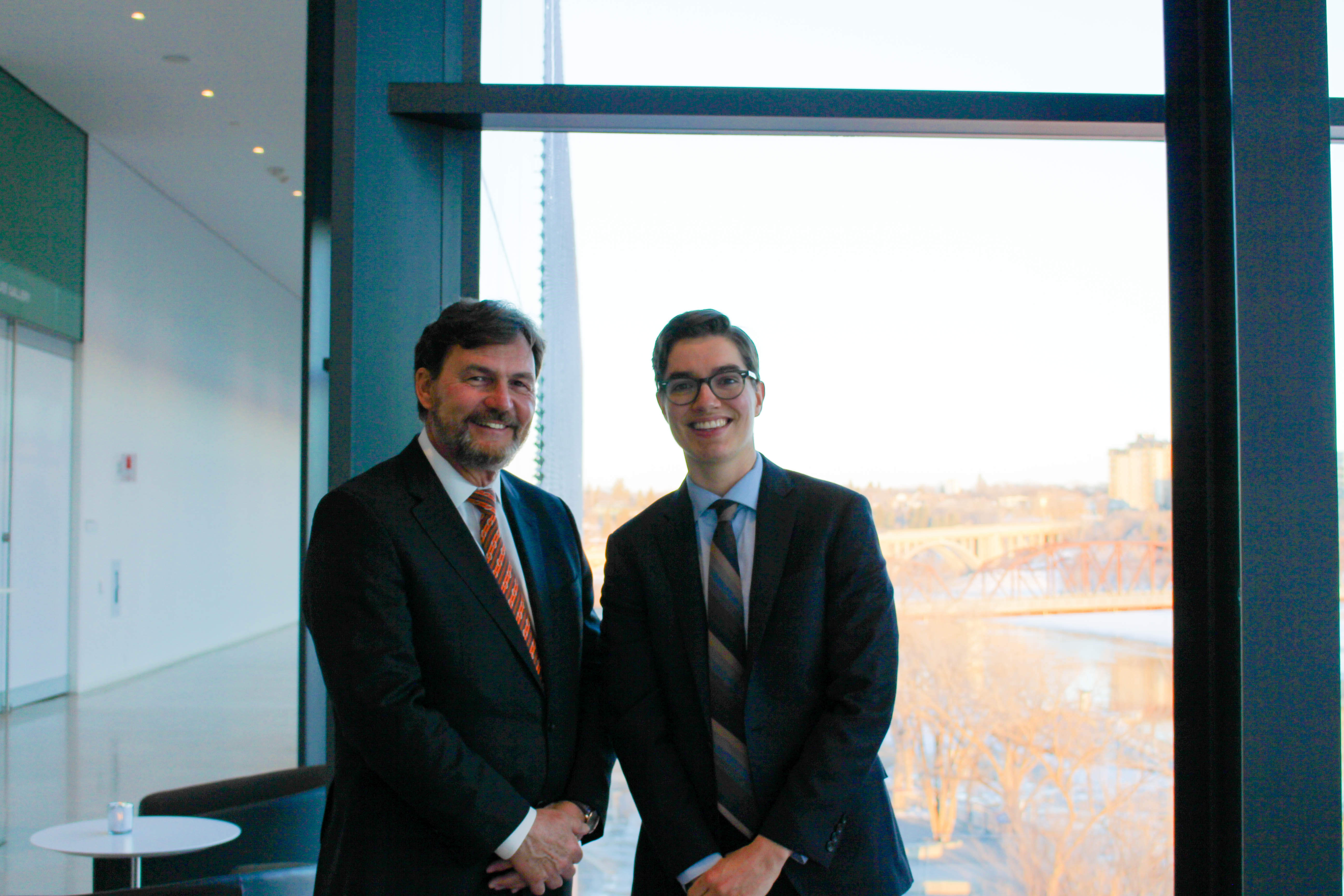
USask Law graduate to clerk for Supreme Court Chief Justice Wagner
Katherine Starks has an interesting few years ahead of her. The recent graduate of the University of Saskatchewan College of Law is clerking at the Saskatchewan Court of Appeal in 2019-2020 after which she will take her freshly-honed skills all the way to the Supreme Court of Canada, where she has been selected to clerk for Chief Justice Richard Wagner in 2020-2021.
By Tonya LambertStarks came to the study of law with a Master’s degree in English Literature, a background which prepared her very well for law school and for clerking. “Having done graduate work in literature, she had done past studies that involved lots of reading and writing combined with issues like interpretation but also the social significance of what she was engaging with,” explains Dr. Dwight Newman.
It was Starks’ love of reading, writing and researching which first attracted her to law. Having worked for a few years after completing university, she was seeking a career that would allow her to engage and develop her talents in these areas. Law seemed like a perfect fit.
Newman believes it was these skills which brought Starks to the attention of the Chief Justice. “I think it’s key that she has superb skills at legal research, analysis, and writing–basically a lot of the same skills I got to see firsthand in her work with me as a research assistant – combined with some distinctive understanding of how the law fits with broader societal issues,” he says.
Starks was invited to interview for positions with several justices of the Supreme Court, but only completed one interview. She explains, “There is an order in which the judges and the committee hire out of the pool of applicants. The Chief Justice conducts his interviews and does his hiring first. So, for me, I had some interviews scheduled with other judges, but the week before I was scheduled to go to Ottawa for those interviews, I had a Skype interview with the Chief Justice and then he hired me. So, I didn’t go to Ottawa for the rest of the interviews.” Starks booked a study room in the Law Library to do her interview with the Chief Justice. “It was a really enjoyable conversation. There were a lot of the sorts of questions that you would expect in a job interview and then also a little bit of substantive law, discussing a recent decision of the Supreme Court,” explains Starks.
Chief Justice Wagner, like his predecessor, former Chief Justice McLachlin, is a strong advocate for improving access to justice in Canada. “We talked a fair bit about Access to Justice issues in my interview,” says Starks. “I think that some of the opportunities that I’ve had, such as taking Professor Buhler’s Access to Justice seminar and learning about those issues at CLASSIC, allowed me to speak to those issues in an informed way which I think helped the interview go well.”
Newman agrees that Starks’ engagement with social justice issues would have made her an appealing candidate. “She has done ongoing volunteer work on social justice causes through which she also has a broader perspective on the world,” states Newman. “And, frankly, her clinical work at CLASSIC would also have involved her in connecting the law with broader social issues that means she brings some fresh perspectives to the Court. They’re ultimately looking for students with all the important technical legal skills combined with something extra in terms of some sophisticated understanding of the law, and Kath brings all of that.”
Starks is very much looking forward to her time clerking at the Supreme Court, where her days will be filled with researching. “I am excited to continue learning about how the justice system in Canada works. I’m excited to work on complicated legal problems with an interesting and brilliant group of people. I hope to keep developing as a legal researcher and problem solver,” says Starks. “I am interested in litigation, so I am excited to be exposed to current litigation at the highest level in Canada to learn more of the ins and outs of how that works.”
Newman, who himself clerked for Chief Justice Lamer and Justice LeBel at the Supreme Court, outlines what Starks can expect from her time at the country’s top court. “It’s a unique opportunity to get a peek inside the Supreme Court right at the start of a legal career – to work with a judge (and in her case, the Chief Justice of Canada!) and get to talk with that judge about the law and what’s going into the decision-making. It’s a chance to work with a group of very talented recent law graduates from across the country.
It’s a chance also to see the advocacy that comes before the Supreme Court of Canada, some of it at the very top of the profession but also with learning chances from seeing when advocacy doesn’t work out as well too. So, it’s a superb learning opportunity in many respects.”
CBA Saskatchewan congratulates Katherine Starks on her achievements and wishes her the best of luck in her future endeavours.
This article originally appeared in the Summer 2019 issue of CBA Saskatchewan's Bar Notes publication and is being shared with permission of CBA Saskatchewan.
